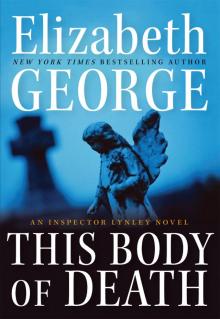- Home
- Elizabeth George
Just One Evil Act il-18 Page 12
Just One Evil Act il-18 Read online
Page 12
19 April
VILLA RIVELLI
TUSCANY
She was a sinner. She was a woman who had promised God the gift of her person if He would grant her a single prayer. He had done so, and now she was here, in the simple handmade cotton of summer and the rough wool of winter, where she had been for nearly ten years. She kept her breasts bound tightly against temptation. The thorns of the rose bushes within her care she tediously removed from stems of the plants, and these she fixed within the undergarments she wore. The resulting pain was constant, but it was required. For one did not pray for a sin, be cursed with its granting, and then go untouched to the end of one’s days.
She lived simply. Above the barn into which she herded goats for milking, her rooms were small and plain. A bedroom furnished with a single hard bed, a chest, and a prie-dieu with a crucifix above it, and the rest of her lodgings merely a kitchen and a tiny bath. But her needs were few. Chickens, a vegetable garden, and fruit trees provided food. The occasional fish, flour, bread, cow’s milk, and formaggio came from the villa, and this she received in exchange for the care that she took of the villa’s grounds. For its inhabitants never left the place. No matter the season or the weather, there they remained within the walls of Villa Rivelli. And so she had lived, year after year.
She wanted to believe that God’s grace would come upon her at some time. But as the years passed, it had begun to seem that a different truth lay at the heart of the matter: Sometimes our temporal suffering is not enough. Nor will it ever be.
He had said to her, “God’s will isn’t something we can anticipate when we pray, Domenica. Capisci?” And she had nodded. For how could she not understand this simple tenet of her faith when his eyes spoke of the sin she’d committed, not only against God and against her family but against him most of all?
She had reached to touch him then, only wanting to curve her hand on the warm flesh of his cheek and to feel the plane of a cheekbone that gave his face its handsome structure. But his lips formed a sneer of distaste, so she dropped her hand to her side and lowered her eyes. Sinner and sinned against. This was who they were to each other. He would never forgive her. She could not blame him.
Then he had brought the child to her. The girl had skipped between the great gates of the Villa Rivelli, and her astonishment at the wonder of the place was ablaze upon her pretty face. She was dark like Domenica herself, with eyes the colour of caffè, skin the colour of noci, and hair a cascata castana: waves of darkness shot through with red in the sunlight, falling to her waist and asking for fingers to caress it and hands to brush it and someone—like Domenica—to tame it beneath the springtime sun.
The child had darted first to the great fountain that shot rainbows into the crystalline air. It was a large circular pool on the lawn, midway between the great villa gates and the loggia that gave way to the enormous front doors. She had dashed next to the loggia itself, where the ancient sculptures in their curved embrasures still shockingly represented the antique Roman gods. She cried out a word that Domenica—from the window of her lodging above the barn—could not understand in the distance between them. She turned in a whirl of her beautiful hair and called out in the direction from which she’d come.
Domenica had seen him, then. He’d walked onto the grounds in that way of his that she’d known from the time of their shared adolescence. He struts, said her girlfriends. He is danger incarnate, said her aunts. He is our nephew and we give him shelter as we must, said her father. So it had begun. And when he walked between the gates of Villa Rivelli with his smoky gaze fixed on the child ahead of him, Domenica’s heart had leapt high in her chest and the thorns of her garments had dug in deeply and she had known not only what she wanted—what she still wanted—but also what was meant to be. Almost ten years of punishment at her own hands, and had God forgiven? Was this her sign?
“This you must do for me” had not been spoken from the mouth of God, but how did God really speak unless it was through his servants?
The child had skipped to him and had looked up and had spoken, and in the distance Domenica had watched him tenderly cup the girl’s head and nod and touch her forehead. And then with his hand on her shoulder, he’d turned her from the enormous villa and he’d gently guided her on the path of amber sassolini and walked its curve to the old camellia hedge where an arch gave way to an expanse of beaten earth upon which the stone barn rose. Seeing him with the child like this, Domenica had felt the first stirring of hope.
From within, she had heard their footsteps on the stairs. She’d gone to meet them. The door was open, for the day was warm, and streamers of brightly coloured plastic kept the flies without and the fragrance of baking bread within. When she’d parted the streamers, she’d looked upon them both: the man and child. He stood with his hands upon her shoulders. She stood with an upturned face lit with anticipation.
“Aspettami qui,” he had said. He was speaking to the child, and she nodded to indicate she understood. “Tornerò,” he added. She was to wait in this place. He would return.
“Quando?” she asked. “Perché Lei ha detto—”
“Presto,” he said. He gestured then to Domenica, silent before them with bowed head and heart a beating boulder within her chest. “Suor Domenica Giustina,” he said although his tone was not one of respect. “Rimarrai qui alle cure della suora, sì? Capisci, carina?” And the child had nodded. She understood. She would remain here with Sister Domenica Giustina, to whom she had just been introduced.
Domenica did not know the child’s name. She was not given it and she dared not ask, for she was not worthy of the information yet. So she called her Carina, and the child accepted this graciously.
Now, she and the child were among the vegetables, nascent in April but soon to produce. They were weeding in the pleasant warmth of the day. They hummed separate tunes and periodically glanced up at each other and smiled.
Carina had been there less than a week, but it seemed that she had been with Domenica always. She spoke little. Although Domenica often heard her among the goats, chatting to them, she communicated only in words or phrases or simple sentences to Domenica. Many times Domenica did not understand her at all. Many times Carina did not understand Domenica. But they worked in harmony, and they ate in harmony, and when the day ended they slept in harmony as well.
Only in prayer did they differ. Carina did not kneel before the crucifix. Nor did she use her beads although Domenica had pressed into her hands a rosary carved from the pits of cherries. She’d hung it round her neck in a sacrilegious collana that Domenica had removed hastily and pressed back into her hands with the tiny crucifix nested among the beads, with the corpus facing upward so that she could see and not be mistaken about its use. But when she still did not use it for prayer, when she could neither mouth the words nor their responses at Domenica’s side in their morning, noontime, and evening devotions, she understood that Carina lacked the one thing necessary to eternal life. This was a sign from God.
Domenica rose from kneeling among the burgeoning peppers. She pressed her hands into the small of her back, and the thorns questioned her with the pain of their injection into her flesh. Surely, they asked, it was time for their removal now that Carina’s presence suggested that she had been forgiven by God? But no, she decided. Not yet. There was work to be done.
Carina rose also. She looked at the cloudless sky, not fierce as it would be in summer but pleasant and warm. Behind her, clothing hung on a line to dry: the garments of the little girl she was. She’d brought nothing with her aside from what she’d had on her back, so now she wore the white linen of an angel, and through it her child’s form was like a wraith with the spindly legs of a foal and the matchstick arms of a sapling tree. Domenica had fashioned two such garments for her. When winter arrived, she would fashion more.
She gestured to Carina. Vieni, she said. Come with me. She left the garden and waited to see that the child shut its gate behind her and checked—as she had seen Do
menica do—to ensure that its latch was fixed.
Domenica led Carina to the arched opening in the camellia hedge that gave them admittance to the immediate area around the villa. The child loved this place and, as long as Domenica could watch her, she spent two hours each day exploring it. She loved the peschiera with its hungry goldfish that Domenica allowed her to feed. She danced round the fish pool’s rectangular length, and at its western end, she perched on the wall that overlooked the perfect pathways and parterres of the giardino below. Once, Domenica had taken her there, among the flowers in their precise arrangements, and they’d stolen a look at the Grotta dei Venti, its cavelike shelter of shells and mortar exhaling cool air onto them, seeming like the breath of the lichenous statues that stood on pedestals within.
Today, though, she took her to another place, not of the grounds but of the villa itself. For on its eastern side, steps led down to a pair of great green doors and within these doors lay the cellars of the villa, vast and mysterious and disused for the past one hundred years. Time was the cellars housed wine, and the ancient barrels and casks spoke of this use. There were dozens of them, dust-covered and bound to one another by the webs of a century’s spiders. Among them, the terracotta urns that once held olive oil were black with mould and the wooden presses that had created that oil bore the rust of disuse upon their gears and a fine down of grime along the metal courses and the spout from which l’oro di Lucca had once seeped with delicious abundance.
There was much to explore in the cellar: vaulted ceilings where the black mould grew, uneven floors of stone and tiles, ladders balanced against huge casks, enormous sieves lying in a forgotten pile, a fireplace with the ashes of long-ago fires still dormant within it. The smells were rich and varied. The sounds were hushed: just the cries of the birds outside, the sound of a goat bleating, the rhythm of water dripping, and above them the faintest vocal music as if the angels of heaven were singing.
“Senti, Carina,” Domenica whispered, a finger at her lips.
The child did so. When she caught the disembodied singing, she said, “Angeli? Siamo in cielo?”
Domenica smiled to think that this place could ever be mistaken for heaven. She said, “Non angeli, Carina. Ma quasi, quasi.”
“Allora fantasmi?”
And Domenica smiled. There were no ghosts here. But she said, “Forse. Questo luogo è molto antico. Forse qui ci sono fantasmi.”
She had never seen one, though. For if ghosts wandered the cellars of the Villa Rivelli, they did not haunt her. Only her conscience did that.
She allowed Carina some moments to discover that this place held no danger to her. Then she beckoned her to follow. There was more within these dim, damp rooms, and its promise was Domenica’s salvation.
There was faint light. It came from windows at the villa’s base. They were obscured by shrubbery and filthy with having been ignored so long, but enough light came through them to see the passages that led from one vaulted room to another.
The one she sought was deep within the cellar, and their footsteps echoed against the cool walls as they made their way to it. It was entirely different from the rest, lined with barrels but having a harlequin floor, and in this floor’s centre lay a marble pool. From this spot had come the sound of water that they’d heard. It bubbled up from a spring beneath the villa, and it filled the pool and drained from this to a hole in the floor from which it trickled outside to go on its way.
Three marble steps descended into the pool. Along its sides, green mould grew. Its bottom was black. The grout that held the marble in place was dark with mildew, and the air in the room was pungent.
But it was the pool itself that was important to Domenica. She’d never been in it. She’d avoided it because of the mould and the mildew and whatever else might have been living within the water. Now, though, she knew. The word of almighty God had told her.
She gestured to the pool. She removed her sandals. She motioned for the child to do the same. Then she lifted her gown over her head and she laid it carefully on the floor. Just as carefully, she descended the slick marble steps and she entered the pool. She turned back to Carina and gestured again. Fai così, her movements said.
But Carina’s eyes were wide. She remained immobile.
“Non avere paura,” Domenica told her. There was nothing to fear in this place.
Carina swung around. Domenica thought she might wish the comfort of privacy to remove the cotton shift she wore, so she hid her face in her hands. But instead of the sound of clothes being removed, there were racing footsteps against the floor as the child retreated.
Domenica lowered her hands swiftly. No one was there except herself, slime on her legs from the water of the pool as she mounted the steps to climb out of it. She looked down to make sure of her footing. She then saw what the child had seen.
Her tightly bound breasts were bleeding. Blood from the swaddling she used on the rest of her body was beginning to drip down her legs. What a sight she had presented to a child who did not know of her sin! She would have to explain in some form or another.
For it was crucial that Carina have no fear.
HOLBORN
LONDON
Barbara Havers had developed a snout among the members of the fourth estate. With him she had a back-scratch sort of relationship that she’d taken care to nurture. Sometimes he provided her with information. Sometimes she did the same for him. Mutual snoutship, as she liked to think of it, was rather unusual in her line of work. But moments arose when a journalist could be useful, and after her conversation with Superintendent Isabelle Ardery, Barbara reckoned she was at such a moment.
The last time she’d met her snout, it had cost her a bundle. Foolishly, she’d suggested lunch and he’d been more than happy to oblige her. She’d ended up having to pay for the lout’s roast beef, Yorkshire pud, and all the et ceteras in exchange for a single name from the bloke.
She wasn’t about to make that mistake twice as she could hardly put “gathering information from a tabloid journalist” down on a convenient expense account. So she made arrangements to meet her snout at the Watts Memorial. This worked out fine because the journalist was covering a trial at the Old Bailey anyway.
It had begun to rain as she’d left the Yard. The downpour increased as she wended her way to Postman’s Park. She found shelter under the green-tiled roof that preserved the Watts Memorial from the ravages of both time and London’s weather, and she lit up a fag beneath a particular memorial celebrating an act of equine heroism in Hyde Park: a runaway carriage in 1869 and the requisite damsel in distress. The death involved was to her rescuer, one William Drake. Alas, Barbara thought, they didn’t make men the way they used to.
And they certainly didn’t make them like Mitchell Corsico. When he appeared from the direction of the Royal Courts of Justice, he was garbed as usual, like an American cowboy. Barbara wondered, also as usual, how he got away with the get-up. Obviously, one’s manner of dress at The Source was not nearly as important as one’s manner of gathering information for the scurrilous tabloid.
She had that in spades, and she intended to give it to Corsico. One way or another, a fire was going to be lit beneath Superintendent Ardery’s Pilates-maintained bum, and Barbara reckoned she’d come up with that way. She’d brought with her photographs that she’d snared from Azhar’s flat that morning. There was one of him. There was one of Hadiyyah. There was one of Angelina Upman. Best of all, there was one of the three of them together making at happy families in the distant past.
Corsico spied her. He clomped through puddles in his pointy-toed boots and beneath the memorial’s roof he removed his Stetson. Barbara half expected him to say, “Howdy, ma’am,” at this, but it turned out he merely wished to remove the excess water from it, which he did. She received most of it against her legs. Good thing, she decided, that she was in trousers. Still, she brushed the water off and eyed him. He said sorry and dropped onto the bench at her side.
“So?
” he said.
“Kidnapping.”
“And I should be gobsmacked by this information because . . . ?”
“Kidnapped in Italy.”
“And kidnapped in Italy should send me scurrying for my laptop and an Internet connection why . . . ?”
“The victim’s British.”
Corsico gave her a look. “Okay. I’m moderately interested.”
“She’s nine years old.”
“I’m getting intrigued.”
“She’s bright, personable, and pretty.”
“Aren’t they always?”
“Not like this.” Barbara brought out the first photo, the one of Hadiyyah. Corsico was no fool. He clocked at once that she was mixed race, and one eyebrow rose to indicate Barbara was to proceed with the titillation of his brain cells. She handed over the photo of Angelina Upman, then the one of Azhar, then the happy family together with Hadiyyah in a pushchair at two years old. Everyone, thank God, was suitably attractive.
The Source, Barbara knew as one of its devoted readers, was never going to go front page with anyone—kidnapped, dead, or otherwise—unless that person had a certain look. Hardened criminals with mugs like three-day-old roadkill made the front page if they were arrested for a crime that had taken the tabloid’s fancy. But an ugly kid kidnapped? An ugly woman murdered? A grief-stricken father or husband with a face like a salmon? Not going to happen.
“Kid could be dead,” Barbara pointed out, although she despised herself for having to use the word kid to refer to Hadiyyah, not to mention dead. But Corsico couldn’t be made to know her interest in the case. If he twigged, she knew he’d not cooperate. He’d see at once that he was being used and, story or not, he would walk away. “Kid could be in a Bangkok cathouse,” she added. “Kid could be sold to someone with a cellar in the Belgian countryside. Kid could be in the US by now. Who the hell knows . . . because we bloody well don’t.”

 Well-Schooled in Murder
Well-Schooled in Murder Just One Evil Act
Just One Evil Act This Body of Death
This Body of Death The Edge of the Water
The Edge of the Water For the Sake of Elena
For the Sake of Elena Believing the Lie
Believing the Lie The Edge of the Shadows
The Edge of the Shadows Just One Evil Act: A Lynley Novel
Just One Evil Act: A Lynley Novel In Pursuit of the Proper Sinner
In Pursuit of the Proper Sinner A Moment on the Edge:100 Years of Crime Stories by women
A Moment on the Edge:100 Years of Crime Stories by women Elizabeth I
Elizabeth I I, Richard
I, Richard A Traitor to Memory
A Traitor to Memory Missing Joseph
Missing Joseph A Suitable Vengeance
A Suitable Vengeance Careless in Red
Careless in Red A Banquet of Consequences
A Banquet of Consequences Playing for the Ashes
Playing for the Ashes With No One As Witness
With No One As Witness Deception on His Mind
Deception on His Mind The Best American Mystery Stories 2016
The Best American Mystery Stories 2016 A Great Deliverance
A Great Deliverance In the Presence of the Enemy
In the Presence of the Enemy Believing the Lie il-17
Believing the Lie il-17 The Edge of the Light
The Edge of the Light SW01 - The Edge of Nowhere
SW01 - The Edge of Nowhere A Place of Hiding
A Place of Hiding What Came Before He Shot Her il-14
What Came Before He Shot Her il-14 Payment In Blood
Payment In Blood The Punishment She Deserves
The Punishment She Deserves This Body of Death: An Inspector Lynley Novel
This Body of Death: An Inspector Lynley Novel Just One Evil Act il-18
Just One Evil Act il-18 What Came Before He Shot Her
What Came Before He Shot Her Missing Joseph il-6
Missing Joseph il-6